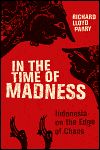I haven't read this book. I was only sent an email, posted a couple of days ago, referring to a couple of reviews. A quick bit of googling tells me that Richard Parry, the author, was correspondent for the British Independent newspaper for the period 1997-1999 covered by this book and has chosen violence as his theme for understanding recent Indonesian history.
Given the short time he was here, he could just as well have chosen kretek cigarettes or herbal medicine as his theme.
I've read a few online reviews of the book by journalists who may have seen a clip of a riot on CNN and none of them seem to portray the societal upheaval that I witnessed in that period. None of them convey the solidarity felt by residents here, but all have that element of touristic voyeurism.

Miko, a long-term resident, a regular reader of Jakartass and occasional commentator, has written the following review. It should save you the expense of buying the book.
Parry's book is a load of onanistic twaddle. While walking through a country in great turmoil all he tells us about is himself, how he is feeling, his emotions, what he is enduring, him, him, him.
A good journalist should be able to report what is happening and convey the scene on the ground in precise objective terms. We couldn't give a flying fart what emotional turmoil they may be enduring, we're not interested no more than I care what the personal emotions of my plumber are as long as he makes a good job of restoring my shower fittings.
Parry tells us that on the morning of the Trisakti shootings he was going to ask his girlfriend to marry him, he tells us how he felt about this and what it would mean for him but then after much agonising he decides not to. Then he goes to the university to watch the demo he stays for an hour or two and then goes back to the hotel where he is told about the shooting. He misses the biggest story in Indonesia in thirty years, but, hey, we know about his domestic situation, sheesh great journo.
In East Timor everyone is cartoonish, the brave, quiet, proud, heroic, romantic Timorese, and the ugly, goonlike, thick, dirty Indonesians none of whom have a redeeming quality.
Of course as soon as the first shots are fired he scarpers for the UN compound and stays there thus having no idea what was going on outside. But we do know that he was tired, emotional and contemplative oh and yes Timorese civilians were being massacred outside the walls. When the first evacuation plane comes he scrambles on board; well, he had no cigarettes left. What do you expect from courageous journalists? He doesn't record how many Timorese women and children he pushed out of the way to get on the plane.
Back in Darwin he agonises for a month in various Irish bars before going back again. This time he sees lots of big burly Aussie and Brit soldiers, whom he clearly doesn't like and describes in insulting terms. You see sensitive souls such as him are offended by men who say "fuck" a lot. He passes over the fact that these brutes were the people who sorted the damn mess out while writers like him were wanking themselves into a coma.
Sorry for the length of this review but I just finished the book last night and I needed to get it off my chest this morning.
Aangirfan comments: In his book, Richard Lloyd Parry makes no mention of the CIA/MI6 role in the toppling of both Sukarno and Suharto.
Quite.





